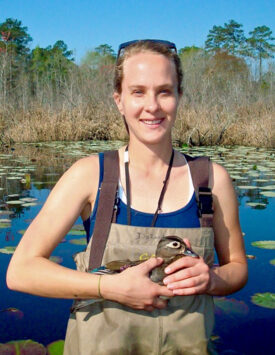Sarah earned her undergraduate degree from the University of South Carolina with a BS in biology and a minor in chemistry. As an undergraduate she worked as a field assistant for Jackie Litzqus, a doctoral candidate examining habitat use, activity, and reproductive parameters of spotted turtles (Clemmys guttata). This experience inspired her to seek a career in ecology and eventually led her to the Savannah River Ecology Laboratory where she worked with Bill Hopkins on a project investigating the maternal transfer of heavy metals associated with coal combustion waste in narrow-mouthed toads (Gastrophryne carolinensis).
Sarah’s Master’s research in the Hopkins Lab focused on the sublethal effects of a commonly-used pesticide on whole-organism responses in a reptile, the western fence lizard (Sceloporus occidentalis). The whole-organism responses she investigated, locomotor performance and energy expenditure and acquisition, also have important implications for an individual’s fitness. After defending her MS thesis in December 2006, she decided to stay on at Virginia Tech. She was involved in multiple other projects, including the effects of stress hormones on respiration in a lizard and several other reptile and amphibian ecotoxicology studies.
For her dissertation research in the Hopkins Lab, Sarah shifted her focus to maternal effects and how they influence offspring fitness. She investigated the influence of incubation temperature on energetic expenditure during embryogenesis in wood ducks (Aix sponsa) and its influence on offspring phenotype (e.g., immunocompetence, ability to thermoregulate). She was also interested in the allocation of steroids (both sex and stress hormones) into eggs and how this may affect traits such as locomotor performance, respiration, growth, and future reproductive output of the offspring.

